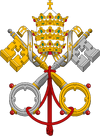| The Holy See |
 This article is part of the series: |
|
|
|
Secretariat of State
Congregations
Tribunals
Pontifical Councils
Administrative Services
Institutes
|
|
The Apostolic Tribunal of the Roman Rota (in Latin, Tribunal Apostolicum Rotae Romanae), for hundreds of years also called the Sacred Roman Rota, is the highest appellate tribunal of the Roman Catholic Church, with respect to the vast majority of its Latin Rite members[1] and several of the Eastern Catholic Churches[2] and is the second-highest ecclesiastical court constituted by the Holy See.[3] The Catholic Church has a complete legal system, which is the oldest legal system still in use today. The court is named Rota (wheel) because the judges, called auditors, originally met in a round room to hear cases.[4]
The Pope appoints the auditors of the Rota and designates one of them the dean,[5] who since January 21, 2004 is Most Rev. Antoni Stankiewicz. The Rota issues its decrees and sentences in Latin.[6] The Rota adjudicates cases in a panel (called a Turnus) of three auditors, or more, depending on the complexity of the matter, assigned by the Dean of the Tribunal, though sometimes a larger number of auditors are assigned to a particular case.[7] The auditors of the Rota have been deemed[by whom?] the cream of the crop of ecclesiastical judges serving various Dioceses around the world.
The Rota's main function is that of a third-instance appellate tribunal, ordinarily reviewing decisions of lower courts if the initial court (first instance) and the first appellate court (second instance) do not agree on the outcome of a case;[8] however, any party to an initial decision before a court of the Latin Church (and also some Eastern Churches) has the right to file a second-instance appeal directly to the Rota.[9] Dominating its case load are petitions seeking the issuance of a decree of nullity, although it has jurisdiction to hear any other type of judicial and non-administrative case in any area of canon law. In certain instances, the Rota has exclusive original jurisdiction, such as any contentious case in which a bishop of the Latin Church is a defendant.[10] If the case can still be appealed after a Rotal decision, the appeal goes to a different turnus, or panel, of the Rota.
The Rota is the highest appeals court, but it is not the highest, or Supreme court. A judgment of the Rota can, however with the greatest difficulty, be vacated by the Supreme Tribunal of the Apostolic Signatura.[11] However, the legal procedure or process used by the judges of the Rota, not the merits of the case, are on trial before the Signatura: the Signatura is only able to grant the petitioner a new trial to be held before a new turnus of the Rota, if the Rota was found to have erred in procedure ("de procedendo").
In recognition of the venerable Tribunal's almost 800 years of history and signal reputation, the Prelate Auditors, by exception to numerous norms promulgated by both Popes Paul VI and John Paul II, are to be addressed as "Most Illustrious and Most Reverend" ("Illustrissimus ac Reverendissimus"). The Dean of the Rota, even if not already consecrated a Bishop, is to be addressed as "His Excellency," ("Excellentia Tua"). All Prelate Auditor Judges of the Rota are styled, "Most Reverend Monsignor."
Auditors of the Rota[]
The active auditors of the Rota, with their dates of appointment by the Pope, are:
|
|
Officers of the Rota[]
|
References[]
- ↑ Codex Iuris Canonici [CIC] canons 1443, 1444.
- ↑ Codex Canonum Ecclesiarum Orientalium [CCEO] canon 1065.
- ↑ See John Paul II, ap. con. Pastor Bonus art. 121, 80 Acta Apostolicae Sedis 841 (1988) (noting that the Apostolic Signatura is the supreme tribunal).
- ↑ Edward Peters, Canon Law—Canonistics—Rota Background, http://www.canonlaw.info/personal_rotademo.htm (updated 21 October 2006).
- ↑ Pastor Bonus art. 127.
- ↑ Pastor Bonus art. 16 (Latin is the official language of the Roman Curia).
- ↑ Canon L. Socy. Gr. Brit. & Ir., The Canon Law Letter and Spirit: A Practical Guide to the Code of Canon Law ¶ 2907, at 837 (Gerard Sheehy et al. eds., Liturgical Press 1995).
- ↑ Pastor Bonus art. 128 § 2.
- ↑ Pastor bonus art. 128 § 1.
- ↑ See Pastor Bonus art. 129 § 1.
- ↑ See Pastor bonus art. 122 (noting that the Apostolic Signatura, from Rotal sentences, hears plaints of nullity, petitions for total reinstatement, and petitions for new examination of status-of-persons cases and also hears misconduct proceedings against Rotal auditors).
External links[]
- Tribunal of the Roman Rota
- Pontifical Council for Legislative Texts
- Giga-Catholic Information
 "Sacra Romana Rota". Catholic Encyclopedia. New York: Robert Appleton Company. 1913. https://en.wikisource.org/wiki/Catholic_Encyclopedia_(1913)/Sacra_Romana_Rota.
"Sacra Romana Rota". Catholic Encyclopedia. New York: Robert Appleton Company. 1913. https://en.wikisource.org/wiki/Catholic_Encyclopedia_(1913)/Sacra_Romana_Rota.
cs:Římská rota la:Rota Romana no:Den romerske rota pt:Rota Romana ru:Трибунал Священной Римской Роты fi:Rota Romana sv:Rota Romana